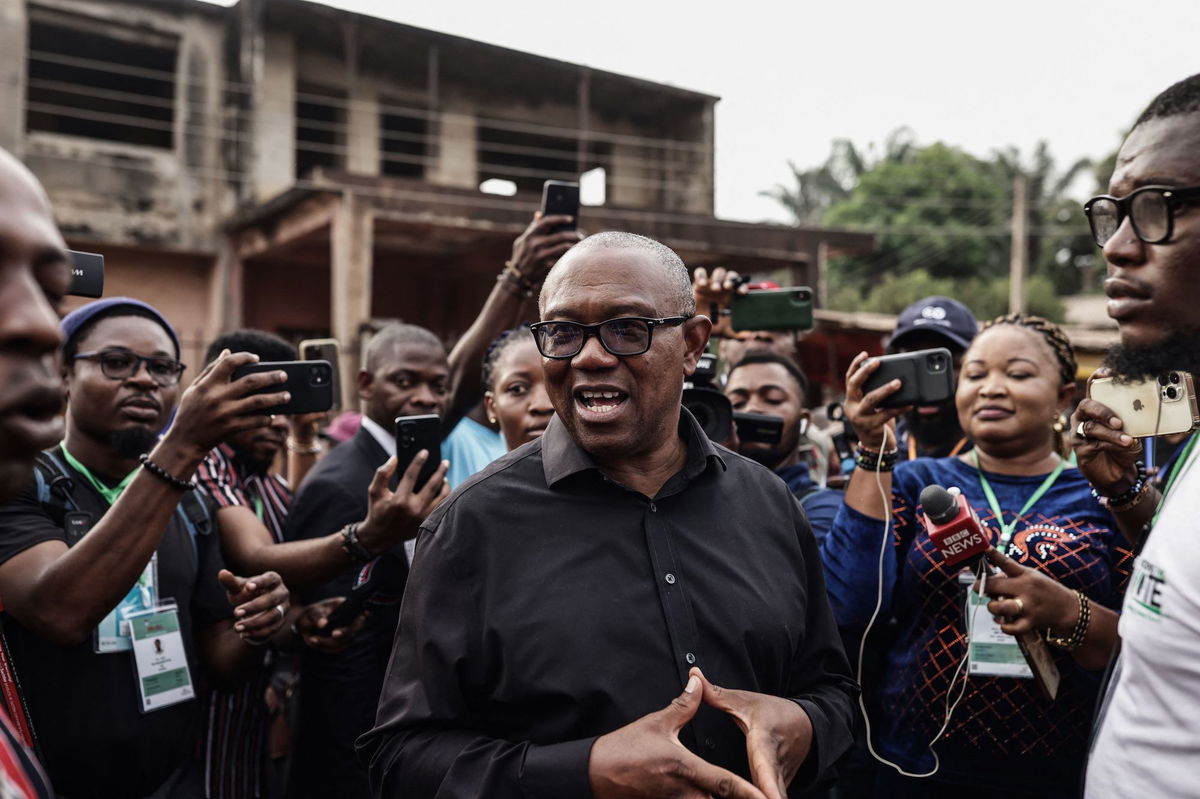Nigerian election results trickle in as Peter Obi lands surprise win in Lagos

Labour Party presidential candidate Peter Obi (center) talks to the media outside a polling station in Amatutu on February 25
By Stephanie Busari, CNN
Nigeria’s third force candidate Peter Obi has won Lagos State, beating influential ruling party candidate Bola Tinubu on his home turf, according to results announced from the state’s collation center. Obi’s win comes as a surprise as the state is a stronghold of Tinubu, who was expected to easily win the state.
Tinubu is a former governor of Lagos State and is known as a political godfather and kingmaker there.
Obi, who is 61 years old, has gained in popularity among young people in particular, many who call themselves ‘Obidients.’
The election is one of the most fiercely contested contests in the country since 1999 and the two-party system that has dominated Nigerian politics since then is facing an unprecedented threat in Obi’s Labour Party.
Ninety-three million people registered to vote and 87.2 million picked up their voter’s card in the country overall, according to the Independent National Electoral Commission (INEC).
Many voters in Lagos complained of intimidation and attempts to suppress their votes. CNN visited one polling unit in Lekki, Lagos, which was attacked and the military was forced to intervene.
Dr. Chidi Nwagwu told CNN: “I arrived at around 10am. Polling materials were late and we set up to start voting. Some thugs arrived and started hitting people with chairs. I was hit several times with a chair. There was a doctor who helped us. A lot of women were attacked, including a pregnant woman. She was knocked to the ground and they smashed her phone.”
Alicia Gberikon said: “There was harassment and if you had a phone that was a crime. People were beaten and had their phones smashed. It was very scary.”
Political analyst Remi Adekoya said Obi’s win was “the biggest shock of Tinubu’s political career.”
“This election is reshaping Nigeria’s political landscape … the victory of Peter Obi in Lagos, the home turf of Bola Tinubu has shown that many Nigerians want a new kind of politics and that the days of godfatherism are numbered,” he added.
However, Michael Famoroti, head of intelligence at Lagos-based data company Stears, cautioned that Obi would struggle to replicate the win across the country.
“Peter Obi’s performance in Lagos is unlikely to translate across the country,” he said.
“Looking at his performance in the other south west states, the Lagos win reinforces the view that the Obidient movement is still somewhat concentrated among a higher economic class.. Elections in Nigeria are still won in rural areas and the data so far suggests that … Peter Obi still faces an uphill task to secure the required votes in critical states.”
Delays, disruption and no-shows
Nigerians went to the polls on Saturday in what is Africa’s largest democratic exercise but it was beset with long delays and some voters didn’t get to vote at all as election officials failed to show up.
Yiaga Africa, a non-profit civic group says it deployed 3,836 observers across the country and was disappointed with the election process.
“There’s a sense of disappointment, quite frankly, with the way this process has gone. Clearly, we’ve not overcome and resolved, our perennially logistical challenges with elections,” Samson Itodo, Yiaga’s Executive Director told CNN.
CNN has contacted INEC for a comment.
The Nigerian election process “lacked efficient planning and transparency during critical stages of the electoral process,” the European Union Election Observation Mission (EU EOM) said in a preliminary statement on Monday.
The observers noted that delays in polling and “information gaps related to much anticipated access to results” on election day led to reduced trust in the Independent National Electoral Commission (INEC).
The mission blamed insecurity in some areas, widespread allegations of vote buying, and ongoing fuel and cash shortages as some of the factors of a challenged election process.
Another observer group, a joint mission of the International Republican Institute (IRI) and National Democratic Institute (NDI), also criticized Saturday’s election, saying the process “fell well short of Nigerian citizens’ reasonable expectations.”
“Logistical challenges and multiple incidents of political violence overshadowed the electoral process and impeded a substantial number of voters from participating,” they said in a preliminary statement.
As a result, the organizations say Nigerians were disenfranchised in many areas, but the “scope and scale is currently unknown.”
And former Nigerian president Olusegun Obasanjo weighed in, asking the electoral commission to repeat polls in locations that were disrupted by violence or where officials failed to show, and even calling on current president Muhammadu Buhari to intervene.
In an open letter Monday, the ex-leader accused INEC of corruption and said “danger and disaster” was looming in Nigeria if the errors of the election process were not rectified.
“Tension is building up,” said Obasanjo, addressing Buhari. “Please let all elections that do not pass the credibility and transparency test be canceled.”
The-CNN-Wire
™ & © 2023 Cable News Network, Inc., a Warner Bros. Discovery Company. All rights reserved.
Bethlehem Feleke and Larry Madowo contributed reporting from Lagos